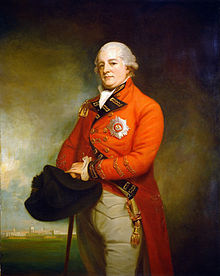Archibald Campbell (British Army officer)
| Sir Archibald Campbell | |
|---|---|

Archibald Campbell by George Romney, c.1792, wearing the uniform of a major-general and the star of the Order of the Bath, and with Madras's Fort St. George in the background
|
|
| Member of Parliament for Stirling Burghs |
|
|
In office 1789–1791 |
|
| Preceded by | James Campbell |
| Succeeded by | Andrew Cochrane-Johnstone |
|
In office 1774–1780 |
|
| Preceded by | James Masterton |
| Succeeded by | James Campbell |
| Governor of Madras | |
|
In office 1786–1789 |
|
| Preceded by | George Macartney |
| Succeeded by | William Medows |
| Governor of Jamaica | |
|
In office 1781–1784 |
|
| Preceded by | John Dalling |
| Succeeded by | Alured Clarke |
| Governor of Georgia | |
|
In office 1778–1779 |
|
| Preceded by | James Wright |
| Succeeded by | Jacques Marcus Prevost |
| Personal details | |
| Born |
21 August 1739 Inveraray, Scotland |
| Died | 31 March 1791 (aged 51) Upper Grosvenor Street, London |
| Relations |
General George Campbell of Inverneill, C.B., K.A Colonel Alexander Campbell of Possil, General George Carter-Campbell, Willoughby Harcourt Carter, General Sir James Campbell of Inverneill, Colonel Duncan Carter-Campbell of Possil |
| Military service | |
| Allegiance |
|
| Service/branch |
|
| Years of service | 1758–1789 |
| Rank | Major-general |
| Battles/wars |
Seven Years' War American War of Independence |
Major-General Sir Archibald Campbell KB (21 August 1739 – 31 March 1791) served as governor of Jamaica and Madras. He was a major Scottish landowner, Heritable Usher of the White Rod for Scotland and a Member of Parliament for the Stirling Burghs.
Archibald was baptized 24 August 1739 at Inveraray, Scotland. He was the second son of James Campbell (1706–1760) 3rd of Tuerechan (8th Chief of Tearlach, descended from Clan Campbell of Craignish), Commissary of the Western Isles of Scotland, and Elizabeth (died 1790), daughter of James Fisher, Provost of Inveraray. He grew up with his family at Dunderave Castle, and enjoyed the patronage of both Archibald Campbell, 3rd Duke of Argyll and Henry Dundas, 1st Viscount Melville.
Educated at Glasgow University, and afterwards at the Royal Military Academy, Woolwich. In 1758, he was commissioned into the Royal Engineers. He served with them in the Seven Years' War and was wounded at the Siege of Quebec. He participated in a number of raids along the coast of France, as well as in expeditions in the West Indies. A decade later, in 1768, Colonel Campbell, was made chief engineer of the British East India Company at Bengal, and was successfully employed by the company to head the works on Fort William in Calcutta.
...
Wikipedia
